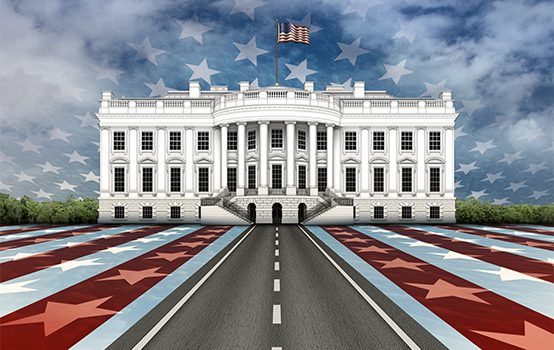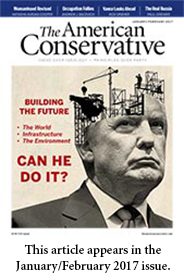A Time of Transition

Donald Trump is president-elect, and the panic-stricken sensationalism that characterized the mass media’s coverage of his campaign has not let up in the slightest since his victory over Hillary Clinton. If you believe what you read in the papers, America has evidently been seized by neo-fascists. Fringe racial agitators have been treated to lavish profiles in the nation’s leading newspapers and magazines, which present them as virtual spokesmen for Trump and his voters. Trump himself continues to be portrayed as corrupt or, at best, a man who has absolutely no idea what he’s doing.
Yet the media is mostly deceiving itself, and what happened on Election Day should have prompted our commentariat to reconsider its biases. Trump, dismissed all along as someone who could not possibly win the White House, defied the polls and pundits alike, and he did so not by appealing to a few hundred white nationalists but by claiming victory in purple and blue states. Pennsylvania, Wisconsin, and Michigan responded to Trump’s appeal to middle- and working-class America. If the media had better understood Trump’s message, his success would not have been such a surprise. And if Hillary Clinton had understood it, she still wouldn’t be president—the magnitude of her defeat on the electoral map was greater than John Kerry’s in 2004—but she would have made the contest closer.
Clinton did win the popular vote, and Republicans cannot rest easy in the belief that the advantages federalism grants their party will keep them in power forever. But if Trump makes good on his economic promises and keeps out of the kinds of nation-building wars he condemned on the campaign trail, his support will only grow over the next four years. Trump’s victory in November was a proof of concept: he demonstrated that an innovative kind of conservatism—closely akin to the paleoconservatism that Pat Buchanan championed—can win in a wider range of states than Bush-style conservatism ever could. Having shown how broadly this approach can succeed, he (and others) can now deepen and develop it, increasing its margins of support to the point where it becomes truly a majority force.
 That will require imagination, and 21st-century conservatism will necessarily develop in part through trial and error. Trump’s lack of experience in government does present risks—but without such risks there would be no possibility of breaking with the failed policies of the last 15 years.
That will require imagination, and 21st-century conservatism will necessarily develop in part through trial and error. Trump’s lack of experience in government does present risks—but without such risks there would be no possibility of breaking with the failed policies of the last 15 years.
Our politics needs a new beginning. Our media would be well served to look at the world through fresh eyes as well. The American Conservative has been careful to give its readers a better sense of the nation’s—and world’s—realities. And just as changes are coming to government and the war of ideas, changes are coming to TAC, too—without, of course, altering our commitment to principle over party and ideas over ideology.
This issue is my last as editor, as I hand the reins of the magazine founded by Pat Buchanan, Taki Theodoracopulos, and Scott McConnell to Robert Merry, an editor, scholar, and conservative ideally qualified to carry on the magazine’s traditions and raise it to new heights. Welcome, Robert, and thanks to the readers and writers who have made my tenure as editor a joy. Happy New Year, and onward to a new America in 2017.
Comments